The Appaloosa Blu-ray Movie
HomeThe Appaloosa Blu-ray Movie 
Kino Lorber | 1966 | 98 min | Not rated | Jan 02, 2019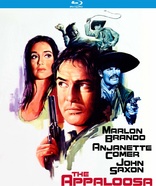
Movie rating
6.6 | / 10 |
Blu-ray rating
| Users | 0.0 | |
| Reviewer | 3.0 | |
| Overall | 3.0 |
Overview
The Appaloosa (1966)
Matt Fletcher, a Mexican-American buffalo hunter is constantly harassed and humiliated by bandit general Chuy Medina. When the bandit steals his horse - the appaloosa of the title - he sets out to even scores; at the climax, single-handedly, he takes on the whole gang.
Starring: Marlon Brando, Anjanette Comer, John Saxon, Frank Silvera, Emilio FernándezDirector: Sidney J. Furie
| Western | 100% |
Specifications
Video
Video codec: MPEG-4 AVC
Video resolution: 1080p
Aspect ratio: 2.35:1
Original aspect ratio: 2.35:1
Audio
English: DTS-HD Master Audio 2.0
Subtitles
English SDH
Discs
Blu-ray Disc
Single disc (1 BD)
Playback
Region A (B, C untested)
Review
Rating summary
| Movie | 3.0 | |
| Video | 4.0 | |
| Audio | 4.0 | |
| Extras | 1.0 | |
| Overall | 3.0 |
The Appaloosa Blu-ray Movie Review
Horsing around.
Reviewed by Jeffrey Kauffman January 12, 2019It’s maybe just a little shocking to hear commentators Lee Pfeiffer and Paul Scrabo talk about some claims that 1966 was the last year for “great” westerns, at least within the context of that particular decade, as they discuss the frequently heard if also obviously debatable thesis that the American Western film basically “died” during the sixties. While it’s perhaps (perhaps) true that 1967 and 1968 didn’t have any real unmitigated classic westerns, there were certainly a number of rather interesting “oaters” (as industry rags have been known to call them) released, including such films as Hombre and Once Upon a Time in the West, even if the second film might understandably be thought of as an Italian western, rather than an American one. But in fact there’s even another 1968 opus that has a tangential link to “spaghetti westerns”, namely the film Clint Eastwood starred in in the wake of his enormous successes with Sergio Leone, Hang 'Em High. But 1969 certainly offered (at least) two films which radically altered the western film landscape, and both of which attained legendary status (not to mention huge box office returns), despite their obvious manifest differences: Butch Cassidy and the Sundance Kid and The Wild Bunch. So while it’s obviously questionable whether 1966 was indeed the “high water mark” for the decade in terms of this particular genre, in a way it hardly matters, since The Appaloosa is most likely not going to make any western fan’s “all time classic” list. It’s a kind of interesting film from a number of standpoints, offering that “reassessment” of what a western could be in at least somewhat the same way that any number of films from the 1950s on had already done (including, it should be added, The Appaloosa star Marlon Brando’s own directorial offering in the idiom, One-Eyed Jacks). The film combines a certain "arty" quality with some kind of odd performance choices, two things that certainly make it distinctive, if perhaps not always actually effective.
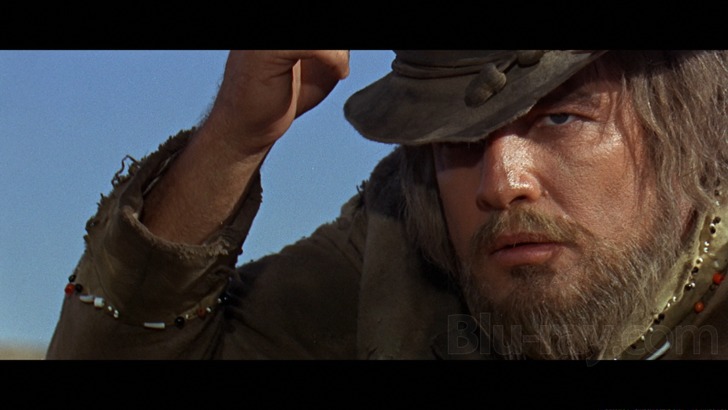
And in fact One Eyed Jacks may come to mind for a number of other reasons as those acquainted with Brando’s 1961 film watch The Appaloosa, since in some ways, including makeup and mannerisms, Brando seems to be revisiting his characterization from that earlier film. He’s ostensibly playing a “different” part, a cowboy named Matt Fletcher who arrives in the dusty town of Ojo Prieto as the film begins and almost immediately has uncomfortable interchanges with an obvious bad guy named Chuy Medina (John Saxon), a churlish sort who also seems to be terrorizing Trini (Anjanette Comer), who seems to “belong” to Chuy, though perhaps not in any official capacity like actually being married.
When Chuy sets his eyes on Fletcher’s horse (an appaloosa, hence the film’s title), things become heated, leading to a rather drawn out “revenge” scenario where Fletcher attempts to get his “ride” back, while also entering into the relationship dysfunction that is obviously at play with regard to Chuy and Trini. The Appaloosa is stylistically often rather fascinating, as director Sidney J. Furie and cinematographer Russell Metty offer all sorts of askew framings, often with faces offered in almost ludicrous close-up, and several shots framed through the body of the titular animal. But from a story perspective, The Appaloosa is perhaps appropriately a pretty bumpy ride, careening from showdown to showdown, with Fletcher more than once seeming on the precipice of mortality, only to miraculously resurrect in order to get to the next fracas.
This is another sixties effort where Marlon Brando’s “quirkiness” may not actually pay many dividends. Despite the prevalence of “tough guy” roles in Brando’s filmography, he seems somewhat ill at ease here, scowling and twitching in sometimes over the top ways. Saxon, in a role a so- called "gringo" very probably wouldn’t be allowed to play in today’s “PC culture” where ethnic characters need to be played by that ethnicity, actually is more of an electric presence throughout the film, and invests it with much of whatever energy it achieves. Comer, also portraying an ethnicity different from her actual one, is an appealing presence in a somewhat underwritten role that leaves her little to do other than look frightened. Any western which features an arm wrestling match as one of the key showdowns between the hero and the villain certainly has something unique to offer (and I'm not even getting into the scorpions that are also part of this sequence), but The Appaloosa may simply be too strange for some diehard western fans, despite its occasionally arresting elements.
The Appaloosa Blu-ray Movie, Video Quality 
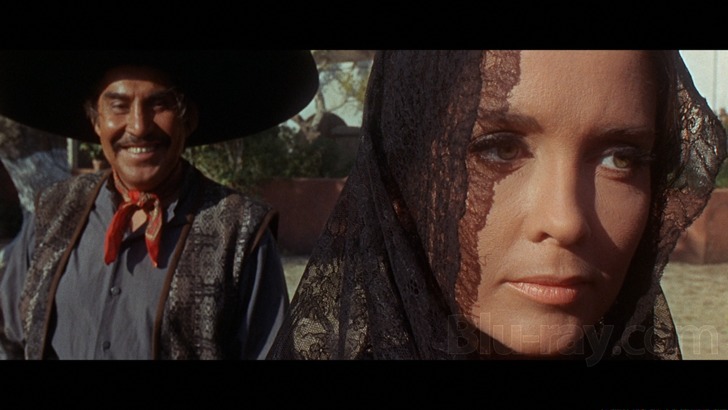
The Appaloosa is presented on Blu-ray courtesy of Kino Lorber with an AVC encoded 1080p transfer in 2.35:1. As Lee Pfeiffer and Paul Scrabo get into in their commentary track, The Appaloosa was shot in the ostensibly cheaper Techniscope widescreen process, a non-anamorphic technique which Pfeiffer and Scrabo mention can tend toward a slightly grainy look, something that is well represented on this transfer (for those who fear any of the "old school" Universal filtering). With a prevalence of extreme close-ups (as can perhaps be gleaned from some of the screenshots accompanying this review), detail levels are quite admirable throughout the presentation, with elements like textures on fabrics looking precise and facial pores being virtually countable. The palette is also generally very well suffused, if arguably just a tad on the brown side at times. The many wide vistas that provide backdrops to several sequences also offer appealing depth of field.
The Appaloosa Blu-ray Movie, Audio Quality 
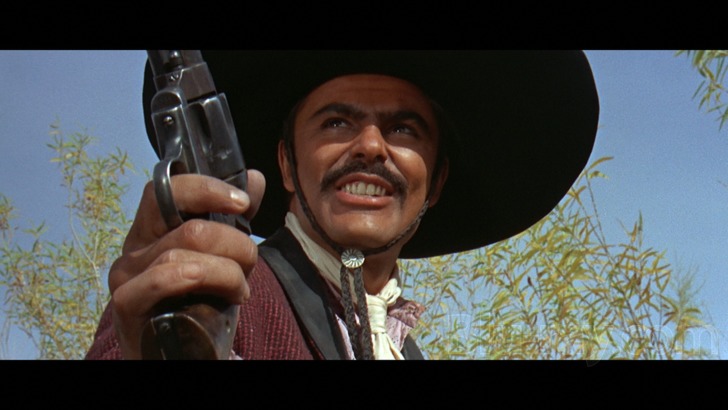
The Appaloosa features a fine sounding DTS-HD Master Audio 2.0 mono track. Universal legend Frank Skinner provides a nicely energetic score which sounds full bodied, and the film's glut of outdoor material also features good ambient environmental effects. Dialogue is rendered cleanly and clearly without any age related issues.
The Appaloosa Blu-ray Movie, Special Features and Extras 
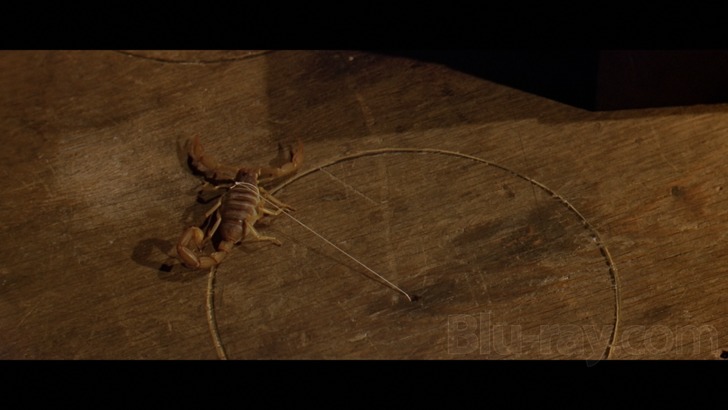
- Audio Commentary by Lee Pfeiffer, Publisher of Cinema Retro Magazine, with Film Historian Paul Scrabo
- The Appaloosa Trailer (480i; 2:44)
The Appaloosa Blu-ray Movie, Overall Score and Recommendation 
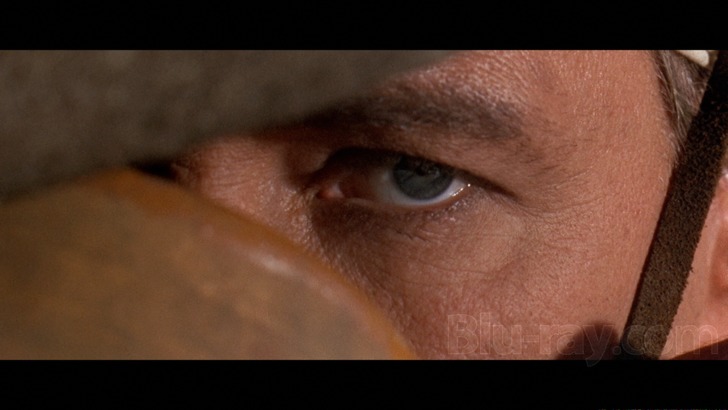
I couldn't help but think Brando "insisted" on the completely weird looking hat he dons at several junctures in this film, a "fashion statement" that seems to speak to the actor's penchant for outré little touches at this point in his career. His performance here is often overly mannered, though the entire film is such an exercise in style that some may actually find Brando's approach perfectly in line with other elements at hand. I personally found Saxon and Comer to be more viscerally involving, and Sidney J. Furie pulls out quite a few directorial stops along the way, but the story itself is kind of labored, with a number of sidebars that aren't properly developed and which tend to add to a sense of lethargy. Technical merits are solid for those considering a purchase.
Similar titles
Similar titles you might also like

Rio Conchos
1964

Jane Got a Gun
2015

In a Valley of Violence
2016

The Stranger Wore a Gun
1953

Vera Cruz
1954

Macho Callahan
1970

The Kid 4K
2019

Major Dundee
Limited Edition
1965

Winchester '73
1950

The Comancheros
1961

The Professionals
1966

The Man from the Alamo
1953

Fort Massacre
1958

Apache
1954

The Undefeated
Fox Studio Classics
1969

The Train Robbers
1973

The Revengers
1972

Sweetwater
Sweet Vengeance
2013

Shalako
1968

Escape from Fort Bravo
Warner Archive Collection
1953